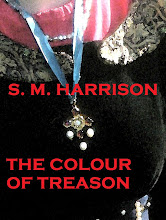I love this place. I have been a couple of times this week as I'm using it as the setting for a short story for TFQ's upcoming 'Shadows' book! It is in my hometown and so there is a tendency to take it for granted, but John Rylands Library really is something special.
History:The John Rylands Library, Deansgate, was founded by Enriqueta Rylands in memory of her husband John Rylands. In 1889 the architect Basil Champneys designed the striking gothic building which now houses the Special Collections of the John Rylands University Library. The Library took ten years to build. Mrs Rylands insisted on the finest materials and the building was lavishly decorated. Traditional craftsmanship was combined with pioneering technology, such as electric lighting. Mrs Rylands purchased books and manuscripts for the Library. When she bought the Spencer Collection of rare books and the Crawford Collection of manuscripts the Library gained international renown. The books were catalogued by the respected bibliographer Edward Gordon Duff. The Library continued to collect and provide access to its collections, led by the librarian Henry Guppy. It was one of the first public libraries to collect archives and papers of historic families.
Mrs Rylands always intended the collections to be used by the public. Members of the general public can still join the Library as readers, without paying a membership charge. The John Rylands Library also pioneered the wider provision of access to rare books and manuscripts through exhibitions, lectures and visits. The Bulletin of the John Rylands Library was established in 1903 and continues to publish scholarly articles concerning the collections and related subjects. Efforts to make the Library more accessible have culminated in the recent Unlocking the Rylands project.The decline in the Lancashire cotton industry dramatically reduced the value of the investments left by Mrs Rylands. A long period of financial struggle led to the merger in 1972 of the John Rylands Library with the Manchester University Library. The Special Collections of the former University Library were transferred to Deansgate, among them the extensive Christie Library. The University Library also contained an important collection of early medical books and the archive of the Manchester Guardian.
The John Rylands University Library continues to collect books, manuscripts and archives. The most significant additions since 1972 have been the deposit of the Methodist Archives and the creation of the Modern Literary Archives. The establishment of The University of Manchester in 2004 has brought Special Collections from the Joule Library, UMIST, into the Library.
Okay so it sounds like the kind of place M.R. James would inhabit...and it looks like it too! :-)


This is where I sat to write. It is SO atmospheric. I only hope I do it justice!
















